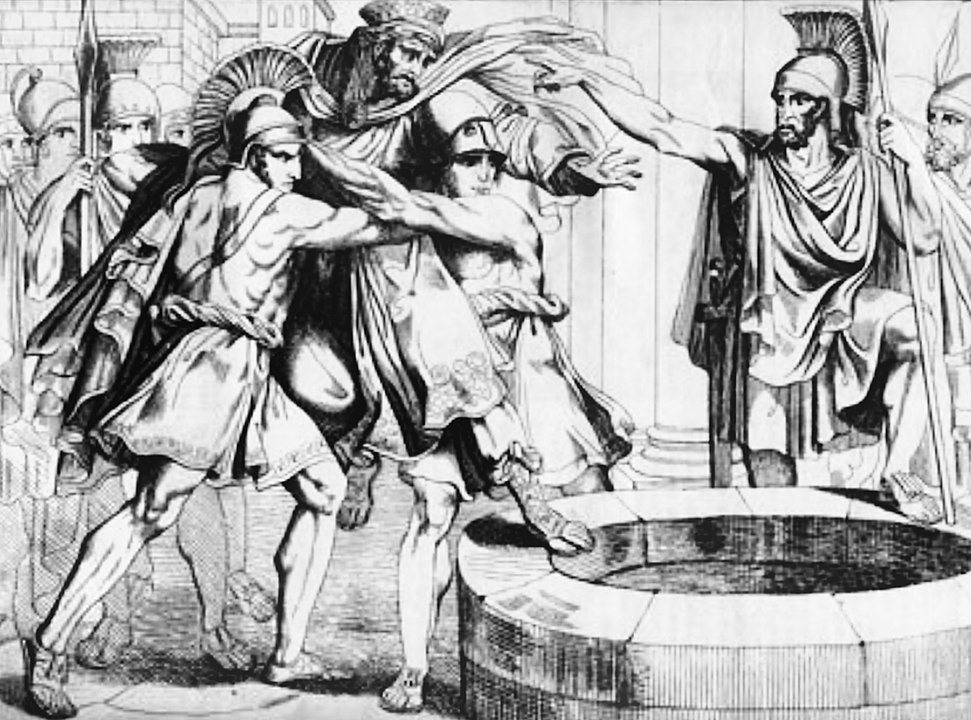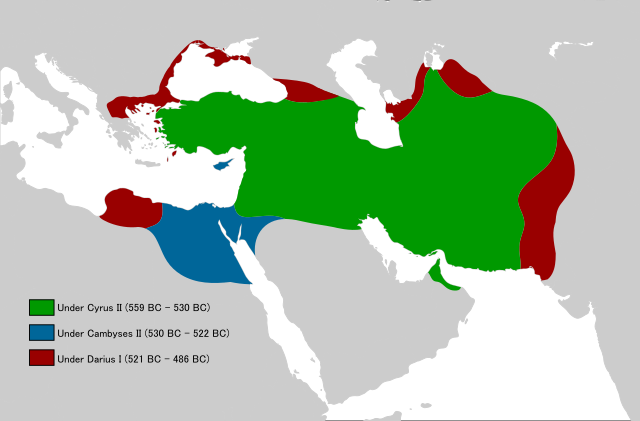Around 500 BC, Greek coastal communities in Asia Minor rose up against the Persian Empire and its leader, Darius. Athens, as a city-state, attempted to send aid, but it was unsuccessful. The insurrection was crushed, and the Emperor decided to launch an invasion of Greece as vengeance. Thus began the First Persian War in 492 BC, which culminated in the surprising defeat of the Persians. Darius’s son Xerxes, who became king after his death, is ready to get revenge for the insult his father suffered. The Second Persian War started in 480 BC, after several years of buildup. It’s a stunning and unlikely triumph for the Greeks once again. A turning point that ushered in the classical period and signaled the end of Persian expansionism.
FIRST PERSIAN INVASION OF GREECE (492 BC to 490 BC)

What caused the First Persian War? (First Persian invasion of Greece)
The Persian king Cyrus II (Cyrus the Great)’s reign in the sixth century BC saw the expansion of his modest kingdom into a massive empire that spanned from India to the Mediterranean. After a string of military victories, he conquered the Lydian kingdom along the Aegean Sea in 547 BC, seizing several Greek coastal towns in Asia Minor in the process. Twenty years later, the newly installed Persian emperor Darius I made the strategic decision to expand the realm by successfully initiating the invasion of Thrace and the seashores of the Sea of Marmara. By virtue of this expansion, Persia was now de facto in charge of the maritime commerce between the Black Sea, the Aegean Sea, and therefore the Mediterranean. A great threat to Greece.
Greek towns of Ionia, which were part of the Persian Empire under Cyrus but enjoyed considerable autonomy, saw their power diminish under Darius. He levied excessive and unfair taxes, sparing only the emperor’s loyal subjects. The Greeks’ rebellion against the Persians was inspired by a sense of injustice and the longing for freedom.
The Ionian Revolt started in 499 BC. The Ionians went to Sparta, the leader of the region’s most powerful army, for help when things seemed bleak, but Sparta, like most other towns on the peninsula, refused to participate despite pleas for “Greek brotherhood.” But Athens alone provided military aid. The naval battle of Ladae, which began in 494 BC and was first won by the Ionians, was ultimately reversed when the Persians recovered their early advantage. When the Greek fleet was attacked, it was completely destroyed. Miletus (Milet, Miletos), a city in the region, was captured and afterwards destroyed.
During the First Persian War
Darius planned an invasion of mainland Greece in 492 BC as retaliation for Athens’ aid to the revolutionaries. To put it simply, this was the first shot fired in the First Persian War (First Persian invasion of Greece). In 491 BC, the Persian Empire sent envoys to every city in Greece, demanding surrender. Some countries agreed, but Athens and Sparta rejected the offer and had the diplomats killed. The First Persian War officially kicked off when the Persian army sailed across the Aegean Sea in 490 BC.
One by one, the Cyclades islands that lied between the two coasts were conquered. Rapidly advancing to Euboea’s southernmost point, the Persian expedition then pushed north to the allied city of Eretria, which had previously been under Athens’ protection. The first stage of the emperor’s vengeance was the swift seizure of its populace and deportation to Mesopotamia.
After that, the Persians continued on toward Athens. When the Persians attacked Athens, the Athenians could have waited there to defend the city, but instead they chose to meet them on the plain of Marathon. In the middle of September in 490 BC, the two sides engaged in a decisive fight. Even though the odds were against them, the Athenians were able to drive back the Persian army’s massive infantry and thick armor.
Who won the First Persian War?
The Greek people quickly adopted Athens’ triumph as a symbol, since it proved that the Persians were not unbeatable. In the wake of their glorious victory at Marathon, the Athenians wanted to further cement their position as the dominant power in Greece. Against this background, the military tactician Themistocles rose to prominence and played a pivotal role in the establishment of a military alliance among several Greek towns known as the Delian League.
Since the Persians achieved many crucial goals during the war, including control of the Aegean Sea and the establishment of subservient governments on all of the islands, the defeat was nonetheless seen as a relative failure on their side. A surprise uprising in Egypt, which had been ruled by the Persians since 525 BC and which likewise sought its freedom, soon diverted Darius’s focus.
SECOND PERSIAN INVASION OF GREECE (480 BC to 479 BC)

What caused the Second Persian War? (Second Persian invasion of Greece)
Death came for Darius in 486 BC, after he had spent his last months crushing an Egyptian uprising. His son, Xerxes I, succeeded him with the goal to “blow a wind of horror across Greece” and revenge the defeat suffered by the Persian army at the hands of the Athenians. He spent over five years planning a massive military campaign, consisting of a marine and land assault. Some modern historians put the number of men involved at between 300,000 and 500,000.
This was accompanied by the mobilization of 600 ships. The Greeks had also been getting ready for the approaching fight, albeit they had less resources at their disposal (about 370 galleys and less than 100,000 troops). Athens supplied the majority of the fleet; using money from the Laurion mines, it had 200 ships built.
The Persian Empire was numerically superior over the Greek possessions in Sicily, but Xerxes still didn’t want to take any chances, so he formed an alliance with Carthage. By allying himself with some of the locals, the emperor also took advantage of the historical rivalry between the several towns. A large number of Greek towns opted to take a neutral stance and not join the Delian League. The Persians won a string of successes in the early months of the war.
How was the Second Persian War
Spring of 480 BC. marked the beginning of the Second Persian War. The Persian army swiftly conquered Thessaly and Pieria, and then pressed on to Athens. The two battles of Artemisia and Thermopylae in the summer of 480 BC resulted in a definite Persian victory but proved more difficult and arduous than predicted, with a strong storm robbing Xerxes of part of his naval fleet and the Greek allies inflicting enormous casualties on the Persian soldiers.
After conquering Boeotia, Xerxes moved on to Attica. Due to the severity of the threat, Athens was forced to evacuate its citizens. In September, the Persians made an incursion into Athens, devastated the city, and slaughtered its remaining inhabitants. The Greeks realized they needed a drastic change if they want to restore power. Xerxes was alerted that numerous Greek generals intended to desert and sought to be let to go. It was a sentiment shared by the Emperor, who was anticipating a triumphant outcome.
Even yet, it was all a ploy, as the Greek ships quickly took advantage of the circumstance to surround the Persian ships, cutting off the emperor’s supply of warriors. When half of the Persian fleet and the ground troops vanished during the Battle of Salamis, it was clear that the tide had turned. Xerxes abandoned his army and sought safety in Asia Minor.
The Persians re-invaded Attica in the spring of 479 BC, reigniting hostilities between the two countries. After initially taking a backseat in the struggle, Sparta now decided to act and join in the combat on an equal footing with the other parties. After a decisive victory in the Battle of Plataea, the combined Greek and ally forces drove the Persians out of Europe. The autumn of 479 BC saw the culmination of the Greek counterattack with the naval victory at Cape Mycale in Ionia.
Who won the Second Persian War?
The outcome in Greece was now certain. The Spartans went home, thinking this is the end. The Athenians decided to keep fighting and, in particular, to lay siege to the Persian-held city of Sestos. A few months later, the Persian commander at Sestos was captured by storm and crucified. Historians like Herodotus and Thucydides wrote that the end of the Persian Wars was signaled by the fall of this city.
That so, there isn’t universal agreement on this, and conflict between the Persians and the Greeks went on for decades. The Athenians gained power and prestige as a result of the war; they used the booty from the Persians to fund the city’s reconstruction, they led the Delian League to victory, and their navy eventually came to dominate the Mediterranean. During the Battle of Eurymedon, which occurred between 469 and 466 BC, Athens and its League allies soundly destroyed the Persian army. In this way, the possibility of another Persian invasion of Greece and the conquest of Greek towns in Asia Minor by the Empire was eliminated.
The aftermath of the Persian Wars
Athens and Persia signed the Peace of Callias in 449 BC to end their wars. To ensure the independence of the Greek towns in Asia, Artaxerxes I (son of Xerxes) swore he would never send ships into Greek seas or troops within three days’ march of the shore. Herodotus, a Greek historian, started writing his magnum opus, the Histories, on the rise and fall of the Persian Empire and the Persian Wars, about 445 BC.
As a result of its pivotal role in the Greek troops’ triumph against the Persians, Athens expanded its dominance to the disadvantage of Sparta. The Peloponnesian War, which lasted from 431 to 404 BC, was fought between the Delian League (under Athens’ dominance) and the Peloponnesian League (under Spartan hegemony).
KEY DATES OF THE GRECO-PERSIAN WARS

498 BC: Capture of Sardis
The Greeks made an invasion in the Asia Minor city of Sardis and attempted to dislodge the Persians from their control there. The lower city was burned to the ground, but the citadel was holding strong. The governor of Sardis controlled the Persian-installed tyrants in the Ionian towns (located around the Aegean Sea, mostly in modern-day Turkey). This partial triumph, however, portended an eventual loss at Ephesus and the implementation of harsh new repressive measures by Darius I, King of Persia.
494 BC: Sack of Miletus
It was only fitting that the Persian Empire took its anger out on Miletus, the catalyst for the uprising of the Ionian towns. Women and children were taken as slaves to the east as the city was sacked. This devastating loss, brought on by disunity among the Greek towns, foreshadowed the First Persian War; on the other hand, Athens’ future dominance was resting on this spirit of cooperation.
490 BC: Darius destroys Byzantium
The city of Byzantium was sacked, looted, and razed to the ground by Darius the Great’s Persian army during the First Persian War. Byzantium, which had been occupied by Greeks since the city’s founding, perhaps two centuries before, was one of the Persian king’s most pressing goals. However, its location on the shore of the Bosphorus, between Asia and Europe, gave it an advantage. Darius, on the other hand, still planned to get revenge on Athens for its role in fomenting rebellion against him.
September 13, 490 BC: Battle of Marathon
As the Persian army arrived on the plain of Marathon, Miltiades, in command of the Athenian hoplites, an assault began. Despite their numerical advantage, the Persians soundly defeated. Only 192 Greeks were killed while 6,400 Persians were killed. However, the tradition claims that a soldier named Pheidippides ran all the way to Athens to spread the news of the triumph before collapsing from weariness. This magnificent competition was being held to celebrate the Marathon tournament. Upon this plain, the First Persian War came to a close, and the golden age of Athens and democracy began.
486 BC: Death of Darius I
Persian King Darius I passed away while on an expedition to put down an uprising in Egypt. Upon his death, his son Xerxes I ascended to the throne with the goal of reversing his father’s failure in Greece. With lightning speed, he started the Second Persian War and set his sights on Athens, the city that had rescued the Greeks in 490 BC. Once upon a time, the Achaemenid dynasty ruled supreme over the vast and strong Persian Empire, and it remained so until the rise of Alexander the Great of Macedon.
483 BC: Discovery of the Mines of Laurion
The Athenians exposed the Laurion silver mines on their own land. As well as contributing to the development of the city, this discovery turned to be crucial during the Second Persian War. Themistocles amassed this fortune by building 200 triremes during the wars with Aegina. But since he thought the threat extended beyond Greece’s borders, thus these sleek vessels became crucial in the Battle of Salamis.
July 480 BC: Junction of the Persian Troops
The Persian army is using Thessalonica as a hub to assemble a massive fleet of ships and warriors, maybe 150,000 strong. Afterwards, the ships follow the shoreline so as to maintain a constant distance from the on-the-ground forces. The Greeks, having reached a consensus at the Congress of Corinth in the summer of 481 BC, coordinate and resolve to evacuate the northern part of Greece. At the pass of Thermopylae, a small spot that limited the advantage of large units, they waited for the Persians.
September 17, 480 BC: Beginning of the Battle of the Cape of Artemision
Three hundred Greek triers, the vast bulk of whom hail from Athens, stood ready at the Cape of Artemisia for the massive Persian fleet. The outcome of the subsequent battles was uncertain, although stopping the Persian assault was the Greeks’ primary objective. The former’s fleet was so intimidating that the Greeks had to retreat. A few days later, though, things begin to change. Even though the Persian fleet had sailed away from the shore, a large portion of it was destroyed by the storm.
19 September 480 BC: Heroic defeat of Leonidas at Thermopylae
Fighting with the support of seven hundred Spartan, Theban and Platonic volunteers, King Leonidas I of Sparta heroically resisted several thousand Persians who surround him. The Lacedaemon leader and his men fought to the death to force the bulk of the Greek troops to retreat. After an unexpected betrayal, the Persians found a way to strike the Greeks in the back, thus disrupting their defense plan. The Greeks then retreated to concentrate on the isthmus of Corinth. Athens was now sacked by the Persians and the Parthenon, then built of wood, and was burned.
29 September 480 BC: Victory of the Greeks at Salamis
Since the Persian fleet was larger and about to deploy Xerxes I’s troops on Greek soil, the Athenian fleet was performing retreat. In the Strait of Salamis, they faced the Persians. But it was a trap, since the Isthmus connecting the island to the mainland was too narrow. The Greek boats, which were easier to control, under the direction of the Athenian tactician Themistocles, were able to destroy the enemy ships that had been trapped in this narrow strait. From a high point in Attica, Xerxes saw his army crushed.
August 27, 479 BC: Death of Mardonios at Plataea
Persian commander Mardonius was slain leading an attack against a Lacedemonian force. The Greeks, led by Pausanias, then defeated the Persians in battle at Plataea, located to the north of Athens. After the Battle of Salamis, Xerxes handed over leadership to Mardonius and went to Persia for the winter. The fighting had continued since the spring, but it paid off for the Greeks. The Persians started to leave the towns of Ionia that they had ruled over since the turn of the last century.
478 BC: The Spartan Pausanias takes Byzantium
Regent of Sparta, Pausanias took the reins of the Greek army against the Persians. After distinguishing himself at the Battle of Plataea, he marched on Cyprus and then seized the city of Byzantium. The city was rebuilt after being completely destroyed by Darius a few years before. General Alcibiades of Athens conquered it in 409 BC.
478 BC: Formation of the Delian League
Some Greek towns joined a league inspired by Themistocles and Aristides, and eventually the league’s leadership was brought back to Athens. The city of Delos remained the official name of this coalition. The purpose of the Delian League was to forestall a fresh Persian onslaught, and it focused only on the navy rather than the land forces. Even when the city was still basking in the glow of its victory in Salamis, an imperialist shift was being signaled.
472 BC: Aeschylus presents “The Persians”
In Athens, Aeschylus staged a play of “The Persians.” The text of this ancient Greek tragedy, which recalled the Second Persian War and, more specifically, the Battle of Salamis, was the first of its kind to survive. Aeschylus, who participated in these conflicts personally, provided graphic and bloody details, but more than anything else, this writer revolutionized the genre by having several actors appear onstage instead of just a narrator and a chorus.
Bibliography:
- Davis, Paul. 100 Decisive Battles. Oxford University Press, 1999. ISBN 1-57607-075-1
- Higbie, C. The Lindian Chronicle and the Greek Creation of their Past. Oxford University Press, 2003.
- Powell J., Blakeley D.W., Powell, T. Biographical Dictionary of Literary Influences: The Nineteenth Century, 1800-1914. Greenwood Publishing Group, 2001. ISBN 978-0-313-30422-4
- Fuller, J.F.C. A Military History of the Western World. Funk & Wagnalls, 1954.
- Finley, Moses (1972). “Introduction”. Thucydides – History of the Peloponnesian War (translated by Rex Warner). Penguin. ISBN 0-14-044039-9.
- Howe, Timothy; Reames, Jeanne (2008). Macedonian Legacies: Studies in Ancient Macedonian History and Culture in Honor of Eugene N. Borza. Regina Books. ISBN 978-1-930-05356-4.
- Hall, Jonathon (2002). Hellenicity: between ethnicity and culture. University of Chicago Press. ISBN 0-226-31329-8.
- Higbie, Carolyn (2003). The Lindian Chronicle and the Greek Creation of their Past. Oxford University Press. ISBN 0-19-924191-0.
- Sealey, Raphael (1976). A history of the Greek city states, ca. 700–338 B.C. University of California Press. ISBN 0-520-03177-6.
- Herodotus, The Histories
- Thucydides, History of The Peloponnesian Wars
- Diodorus Siculus, Library
- Xenophon, Anabasis, Hellenica
- Plutarch, Parallel Lives; Themistocles, Aristides, Pericles, Cimon









